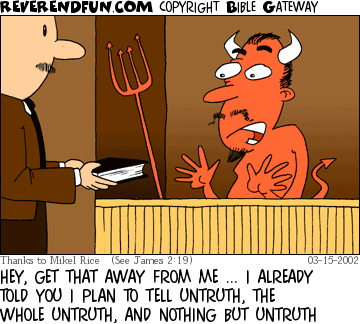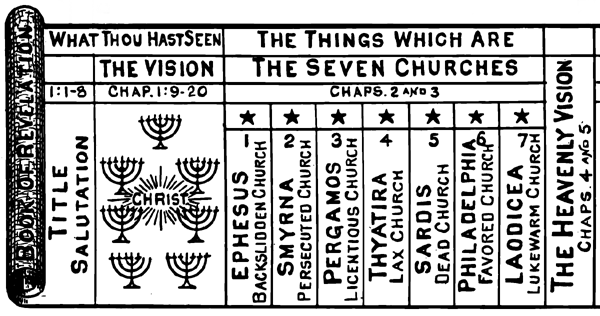
Detail from “Chart of Revelation” by Larkin, showing the first few segments
The first segment, a mere two paragraphs introduces the purpose of this book, a message from Jesus about things that will “soon” take place, a message of prophesy, a message that can be studied, understood, and applied.
This segment is mostly boxed in by what key words and thoughts are repeated throughout, there is not a lot of specific structure in this segment. Pay attention in particular to references to Jesus Christ (or about Him), testimony (testify), and witness (he saw).
The Revelation of Jesus Christ (Segment I, Paragraph 1)
 1:1-2 “The Revelation of Jesus Christ, which God gave Him to show to His bond-servants, the things which must soon take place; and He sent and communicated it by His angel to His bond-servant John, who testified to the word of God and to the testimony of Jesus Christ, even to all that he saw.”
1:1-2 “The Revelation of Jesus Christ, which God gave Him to show to His bond-servants, the things which must soon take place; and He sent and communicated it by His angel to His bond-servant John, who testified to the word of God and to the testimony of Jesus Christ, even to all that he saw.”
What is a “revelation”? The greek word ἀποκάλυψις (apokalupsis) is derived from the word for disclosure, something that brings to light, manifests, or reveals something (Strongs). Apokalupsis occurs only once in the gospels, (in Luke 2:32) in the context of dispelling the darkness the gentiles were under. It is used several times in Paul and Peter’s letters, indicating the unveiling of something hidden which gives light and knowledge to those who behold it, or Christian insight into spiritual truth (Vines). So in essence, we are learning something is supposed to be revealed!
What is a bond-servant? Greek: δοῦλος (doulos). According to Smith’s Bible Dictionary, under mosaic law, people could become a slaves for such reasons as to repay debts or restitution for theft. Upon the conclusion of their period of servitude, the person was normally permitted to leave. However, if a former slave did not desire to leave, he could opt to remain in slavery/servitude for life by declaring his intention before a judge, and have his ear pierced with an awl to indicate his voluntary pledge to perpetual service to his master (see Ex. 21:5, Deu. 15:16).
revelation = something that’s supposed to reveal
bond-servant = life-long committed slave
What does this say about Jesus? He has a revelation, given by God to show his bond-servants things that may soon take place.
What is the implication of this letter being written to Jesus’s bond-servants? This book is written for people committed with their LIFE to serve Jesus (not just to believers)
God wants to communicate to us “the things which must soon take place” ![]() Jesus is showing WHAT is going to happen, not HOW. Most people studying this book try to reason the how. But Jesus is only talking about the what (how = speculation).
Jesus is showing WHAT is going to happen, not HOW. Most people studying this book try to reason the how. But Jesus is only talking about the what (how = speculation).
Communicated to bond-servants by an angel from heaven to John. ![]() He’s still alive (when this book was written anyway) on Patomos. This is not coming from “just anybody”. John = a very CREDIBLE source at the END of his life when he’s had a significant testimony already.
He’s still alive (when this book was written anyway) on Patomos. This is not coming from “just anybody”. John = a very CREDIBLE source at the END of his life when he’s had a significant testimony already.
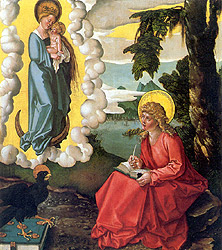
“St. John at Patmos”
by Hans Baldung Grien, 1511AD
What does it mean for these things to take place “soon”? ταχει (tachei) can be a little misleading in its English translation. Although it translates to “soon” or “quickly”, what it means is a measure of speed, how rapidly something will be executed when it comes to pass, not when it will come to pass. When it happens, it will happen suddenly. It does not convey how soon these events will take place. (cf. Guzik, Walvoord)
1:3 “Blessed is he who reads and those who hear the words of the prophesy, and heed the things which are written in it; for the time is near.”
Read = (αναγινωσκω/anaginosko) come to know
Hear = (ακουστος/akouo) come to understand
Heed = (τηρειω/tereo) come to use or live by
You are blessed as you come to read, hear, and heed this book. This book was not written to be vague and unclear, it wasn’t written to be a mystery.
![]() This book was written to be understood.
This book was written to be understood. ![]()
Impact intended: BLESSING for your life. God is not against you or trying to cheat you out of fun. God is trying to bless you, to bring fresh blessing into your life. This book PROMISES to bring blessing to your life.
“for the time is near” (1:3)![]() We only have a window of opportunity to experience the blessing of this book; don’t waste the opportunity, take advantage of it.
We only have a window of opportunity to experience the blessing of this book; don’t waste the opportunity, take advantage of it.
John Introduces Jesus (Segment I, Paragraph 2)
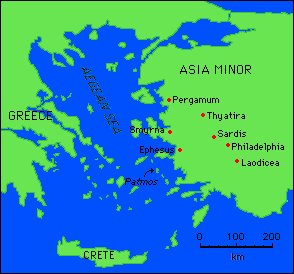 1:4 John to the seven churches that are in Asia: Grace to you and peace, from Him who is and who was and who is to come, and from the seven Spirits who are before His throne, 5 and from Jesus Christ, the faithful witness, the firstborn of the dead, and the ruler of the kings of the earth To Him who loves us and released us from our sins by His blood—6 and He has made us to be a kingdom, priests to His God and Father—to Him be the glory and the dominion forever and ever. Amen.
1:4 John to the seven churches that are in Asia: Grace to you and peace, from Him who is and who was and who is to come, and from the seven Spirits who are before His throne, 5 and from Jesus Christ, the faithful witness, the firstborn of the dead, and the ruler of the kings of the earth To Him who loves us and released us from our sins by His blood—6 and He has made us to be a kingdom, priests to His God and Father—to Him be the glory and the dominion forever and ever. Amen.
John begins this paragraph opening a letter to the “Seven Churches of Asia”. Keep in mind this isn’t Asia the continent, but rather the Roman Province of Asia, which is primarily in modern day Turkey. The names of the seven churches will be spelled out later on in 1:11.
Why Seven Churches?
Seven is a very common and significant number in scripture: it signifies completedness (eg: God rested on the seventh day because creation was complete) and that which is representative (eg: seven of every clean animal taken into the ark,  seven rams required for certain sacrifices, priests were to sprinkle blood seven times, circling of Jericho seven times, seven years of famine in Egypt, etc). Barclay asserts that the symbolism of John writing to the seven churches means he was writing to the whole church. McGee points out that there were other thriving and significant churches in the province of Asia at that time, and suggests that the seven churches addressed were selected to be representative of the whole. Hierapolis, for example, was only 10 miles from Laodicea, and is much less in ruins today.
seven rams required for certain sacrifices, priests were to sprinkle blood seven times, circling of Jericho seven times, seven years of famine in Egypt, etc). Barclay asserts that the symbolism of John writing to the seven churches means he was writing to the whole church. McGee points out that there were other thriving and significant churches in the province of Asia at that time, and suggests that the seven churches addressed were selected to be representative of the whole. Hierapolis, for example, was only 10 miles from Laodicea, and is much less in ruins today.
It is also interesting to note just how common the number seven is in Revelation itself, occurring 54 times. Significant symbols that come in sevens in Revelation include: the seven candle-sticks (Rev 1:12), stars (Rev 1:16), lamps (Rev 4:5), seals (Rev 5:1), horns and eyes (Rev 5:6), thunders (Rev 10:3), angels, plagues and bowls (Rev 15:6-8). [cf. Barclay]
Who is this letter from? There are three listed senders, appears to address all three of God’s triune natures.
- Him who was an is and is to come – A common title for God, describing his unchanging nature, having existed for all time past as well as all time to come.
 He is bigger picture; your life is not the big picture.
He is bigger picture; your life is not the big picture. 
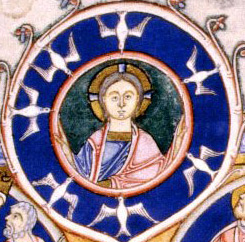 The seven spirits before His throne – Who the seven spirits are is debated amongst bible scholars, but many note that this seems to be in substitution for the Holy Spirit in this otherwise triune description of God. Some common interpretations include:
The seven spirits before His throne – Who the seven spirits are is debated amongst bible scholars, but many note that this seems to be in substitution for the Holy Spirit in this otherwise triune description of God. Some common interpretations include:
- The seven spirits are angels or archangels that minister before God’s throne. Barclay lists the typically given names of the seven archangels as Uriel, Rafael, Raguel, Michael, Gabriel, Saiquael and Jeremiel.
- They refer to seven attributes of the Spirit. This is usually drawn from a description in Isaiah 11:2, “The Spirit of the Lord shall rest upon him, the spirit of wisdom and understanding, the spirit of counsel and strength, the spirit of knowledge and fear of the Lord ; by this spirit he shall be filled with the fear of God.”),
- A portion of the Spirit given to each of the seven churches.
- Jesus Christ – described further in the next two verses
How is Jesus described? After Jesus’s name, beginning in 1:5 a list of titles are added, emphasizing who He is.
| Title Given | |
|
1
|
The faithful witness |
|
2
|
The firstborn from the dead |
|
3
|
The ruler over the kings of the earth |
|
4
|
Him who loved us |
|
5
|
[Him who] washed us from our sins in His own blood |
|
6
|
He has made us to be a kingdom and priests to His God and Father |
|
7
|
to Him be glory and dominion forever and ever |
Let’s examine them one at a time…
faithful = πιστός (pistos) trustworthy, able to be relied on.
witness = μάρτυς (martus) observer or testifier, occasionally translated as martyrBecause Jesus is the one who has seen the things being reported, and is trustworthy in his witness, this account can be relied upon or trusted. We have reason to believe this account.
![]() God’s word (past, present, and future) can be completely trusted; you can trust this book.
God’s word (past, present, and future) can be completely trusted; you can trust this book. ![]()
(2) the firstborn of the dead ![]()
firstborn = the first child of a family, heir
of the dead = Jesus was the first to conquer deathBeing the first-born speaks of the pre-eminance of Jesus (distinction of being notable above others). In the old testament law, the firstborn “received the special family blessing, which meant spiritual and social leadership and a double portion of the father’s possessions—or twice what all the other sons received” (Vines). It is a position of privilege and blessing.
Speculation: Being the firstborn of the dead speaks of the resurrection, that Jesus is the first to conquer death. Being the firstborn implies, perhaps, that there is going to be more? A door opened to others (us) to conquer death as well? This title also appears in Col 1:18 amidst a description of who God is.
(3) the ruler of kings of earth ![]() ultimate authority (King of Kings?)
ultimate authority (King of Kings?)
McGee suggests that this speaks of “His ultimate position during the Millennium”, later to come in Revelation.
(4) Him who loves us ![]()
McGee notes this phrase is “in the present tense and emphasizes His constant attitude toward His own” and that the significance of this is that “The Book of Revelation should not frighten us too much because of the fact that it is from the One who loves us.”
(5) Him who released us from our sins by His blood (1:5) ![]()
Note how sometimes the best commentary on the bible is itself: 1 Pet. 1:18-19 describes this in more detail: “…you were not redeemed with perishable things like silver or gold from your futile way of life inherited from your forefathers, but with precious blood, as of a lamb unblemished and spotless, the blood of Christ.” This illuminates the perfect nature of this sacrifice.
There is a connotation to our sins being released: you are set free, your sins are not sticking to you. He set us free from our sin!
|
Application: I’m Rubber & You’re Glue |
|
You are set free, your sins do not stick to you. Are you latching onto this idea that your sins don’t stick to you like glue? Don’t be deceived into thinking Jesus’ blood isn’t pure enough to clean your sin or that your sin is more powerful than Jesus’ purity. Your sin may be more powerful than you, but Jesus’ purity has more power than the uncleanness of the leper! |
 (6a) has made us into a kingdom
(6a) has made us into a kingdom ![]()
NKJV does us a slight disservice to translate βασιλεία (basileia) as kings. It is not saying here that we are kings. Thayer’s Lexicon clarifies that basileia is actually in reference to the right or authority to rule over a kingdom, ie. that we are conferred royal power and dignity. There is a subtle difference between being granted the authority to rule and actually being the king.
An analogy could be drawn that if your boss at work goes on vacation, he might grant one of his subordinates, such as yourself, the authority to stand in his place while he is gone and make certain decisions on his behalf, but you are not the boss, that title is still reserved for him.
A secondary definition in Thayer’s Lexicon adds additional insight: basileia can also mean “a kingdom, a territory subject to the rule of a king”, ie: even though we are conferred royal power and dignity, we are still subject to the rule of the ultimate King, Jesus!
A kingdom has a lot of people in it, it has power, force, sovereignty. He did not make you into a “support group”, he has given us real power. He has given us a piece of his royal lineage.
“not to be confused with an actual kingdom but rather the right or authority to rule over a kingdom” (Thayer)
You are a ruler, not a failure. It’s one thing to conquer, another to rule. Is your mindset in line with this?
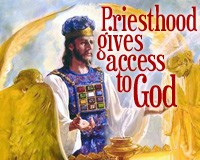 (6b) has made us priests forever
(6b) has made us priests forever ![]()
In the old testament, priests were the only ones who had access to God; in Hebrews, this priesthood is expanded to all believers under the new covenant. The significance, thus, of Him making us priests forever is that we will have eternal access to God.
Forever: This is emphasizing eternity. This is not a side hobby or something you will retire from. You will not be voted “off the island” based on performance or popularity. Your identity is secure.
| Application: Forever Starts Now |
| God has made us to be kingdoms and priests forever. Forever starts now. You are a priests and princesses, beautiful, and worth something. You are a ruler, not a failure. Take that to heart. Your identity is secure. This is not a side hobby you retire from either. “To Him be the Glory…” In this identity we are to bring glory to God forever, by reflecting beauty and glory. |
(7) to Him be the glory and dominion ![]()
This title is a doxology (lit. a “glory-saying” or a liturgical expression of praise to God). He is someone to be praised for his glory and dominion.
Dominion indicates “strength, power, or authority which is exercised over others, and the expression is equivalent to a wish that He may reign” (Barnes). The flip-side of God having dominion over us is that we are under his dominion, ie, under the discipline and authority of God.
His Dominion = under the discipline of God.
| Application: In Dominion To God |
| Is you own life in dominion to God? You bring your own self under the dominion of God through disciplined obedience to God. Is Your Family Out of Control? It is impossible to have your family in control when you’re not under control yourself. |
“The word ‘glory’ here means praise, or honor, implying a wish that all honor should be shown [to] Him” (Barnes). Vines’ suggests δοξα (doxa) the greek word for glory in this verse “primarily signifies an opinion, estimate, and hence, the honor resulting from a good opinion”, ie, the phrase speaks to God being well-thought of, an untarnished reputation.
7 Behold, He is coming with the clouds [Dan 7:13], and every eye will see Him, even those who pierced Him; and all the tribes of the earth will mourn over Him. So it is to be. Amen.
1:7 Jesus coming with the clouds, every eye will see Him… ![]() When Jesus comes back, every eye will see him, even those who pierced him: Jesus is not showing up to just a point in history, but to all of history. Adam and Noah will be there for that event. We’re talking an appearance, not just a momentary event.
When Jesus comes back, every eye will see him, even those who pierced him: Jesus is not showing up to just a point in history, but to all of history. Adam and Noah will be there for that event. We’re talking an appearance, not just a momentary event.
Segment I Review
Revelation was written to those committed with their life to serving Jesus. It is a book that is meant to be read, understood, and applied, and blessings are promised for reading, hearing, and heeding this book. It reveals many spiritual truths about God. It is a prophesy that is communicating things which will happen in the future. Even though John (a credible witness) is who penned the book, Jesus is the origin of this message, so it is trustworthy and can be believed.
We are about to receive a message to seven representative churches from God. Several descriptors/titles of God are given indicating qualities about him such as his timelessness, faithful testimony, pre-eminence, authority, love for us, forgiveness, and glory.
- This book is written to the disciples who have committed their whole lives to serving Jesus, not to the broader group of saints or unbelievers.
- Jesus is going to show WHAT is about to take place, not HOW. Be careful not to focus on speculation.
- This book was communicated through John, a very experienced and credible source.
- The intended impact of this book is to bless your life. This comes through reading, hearing, and heeding this book
- This book is not intended to be confusing; it’s intended to be understood.
- There is a limited window of opportunity to understand and experience the blessings of this book.

